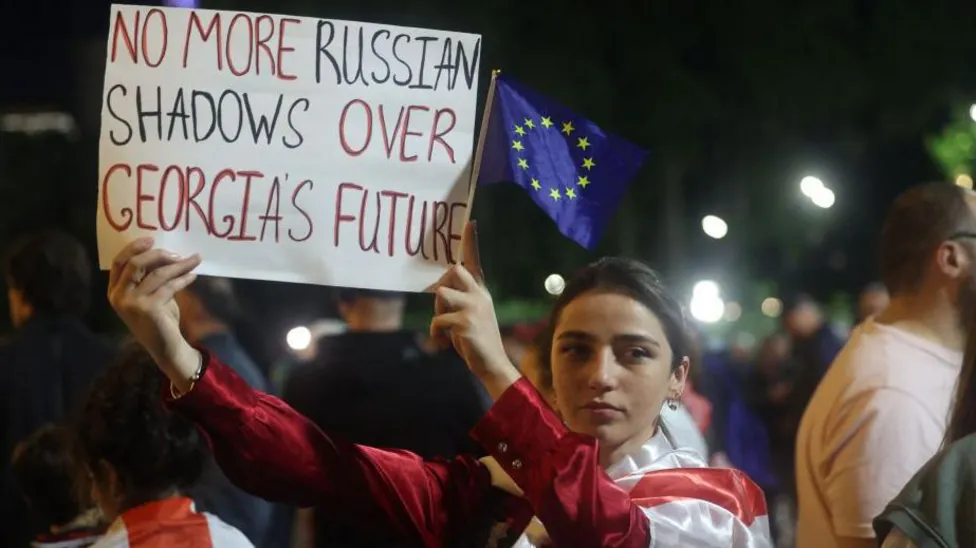Georgia opposition leaders urge UK to oppose foreign influence bill

- Oops!Something went wrong.Please try again later.
Georgian opposition leaders have called on the UK to do more to oppose what they say is a crackdown on civil society in the former Soviet country.
They urged the foreign secretary to show the governing party that the international community was united against the proposals.
The Transparency of Foreign Influence Bill is expected to pass its final parliamentary hurdles in coming days.
Opponents have staged mass protests in the capital Tbilisi against the law.
The legislation would force non-governmental groups and media to register as "organisations serving the interest of a foreign power" if more than 20% of their funding comes from overseas.
The governing Georgian Dream party says the measure would increase transparency and defend Georgia's sovereignty.
But opponents say it will be used by the government to crush opposition voices and parties ahead of a general election in October.
They say it is also designed to disrupt Georgia's ambition to join the European Union, which could not accept the new law.
The legislation has been dubbed "the Russian bill" because it is similar legislation used by the Kremlin to silence its own critics.
The proposal has brought tens of thousands of people out onto the streets in the small country on the eastern coast of the Black Sea.
The US has been vocal in attacking the bill, with National Security Adviser Jake Sullivan writing on X at the weekend that the US was "deeply alarmed about democratic backsliding in Georgia".
He said MPs had to choose between "the Georgian people's Euro-Atlantic aspirations or pass a Kremlin-style foreign agents' law that runs counter to democratic values... we stand with the Georgian people".
In contrast, the UK has been more discreet in expressing its opposition.
In a written parliamentary answer published quietly last week, the Minister for Europe, Nusrat Ghani, said the UK's ambassador in Tbilisi had "consistently voiced our concerns about the proposed law" in recent meetings with the prime minister and president.
She said she had discussed the issue herself with the Georgian ambassador in London last month.
Her only other public remarks came 10 days ago, in a post on social media warning against "excessive use of force by police against peaceful protestors in Tbilisi", which she said was "not in line with democratic values and risks Georgia's Euro-Atlantic aspirations".
But Georgian opposition MPs want Ms Ghani and Foreign Secretary David Cameron to go much further.
Giorgi Vashadze, an MP and leader of the Strategy Builder party, said: "Lord Cameron was one of the leading international supporters of Georgia when we were invaded in 2008.
"We were thankful for his support, which did so much to raise the country's spirits.
"As foreign secretary, I ask him to please do the same to highlight the government's attempts to clamp down on opposition during an election year."
Tina Bokuchava, Georgian MP and parliamentary leader of the United National Movement, said: "These written answers show that the UK government has been privately concerned about the situation in Georgia.
"We now need these concerns to be made public, so that the ruling party understands that the international community is united in opposition to such authoritarian actions."
A spokesperson for the UK's Foreign, Commonwealth and Development Office told the BBC the UK is "gravely concerned" about the foreign influence bill.
"The accompanying rhetoric and excessive force used by police against protesters are deeply concerning," they said.
"We urge the Georgian authorities to show restraint in policing peaceful demonstrations."
"The UK continues to engage with the Georgian government and civil society groups in Tbilisi, and our ambassador has consistently made our concerns about the proposed law known to the Georgian government, most recently to the prime minister on 22 April."

